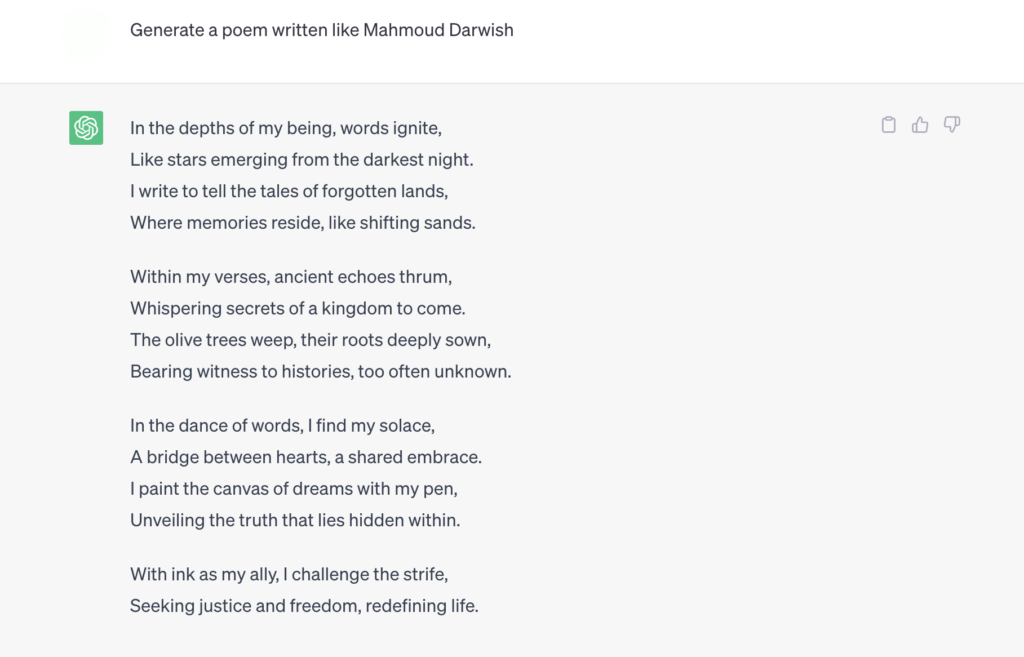Does ChatGPT Measure Up to History’s Acclaimed Arab Poets?

By: Yaara Aleissa / Arab America Contributing Writer
An Emerging Software
ChatGPT has proved itself to be a powerful force in writing but does it measure up to the works of historic Arab poets?
ChatGPT launched in late November 2022 but didn’t get a booming rise of users until February to April of this year. The app has found its place in many industries with the most prominent being marketing, education, and healthcare. Although, some of its users do so without the knowledge of employers which blurs the line of originality. To make matters more difficult, the work produced by the AI software isn’t one that is easily discernible.
A recent statistic found that 53% of humans could not decipher between the work of ChatGPT and human-produced work. It then leads to the question of how originality and ownership are defined with this tool that has proven its powerful capabilities.
This was put to the test through the works of Arab poets Al-Mutanabbi, Khalil Gibran, and Mahmoud Darwish. These poets built their reputation on their unique ability to cultivate words into magnificent works of poetry. With rhythm, emotion, and a portrayal of real-world circumstances and grievances. Abilities not typically attributed to computer software. A human’s uniqueness revolves around his ability to stand out from any other creature. So is there a new challenger?
To begin this inquiry the phrase “Generate a poem written like..” was used and interchanged to the respective poet.
ChatGPT’s Poem of Al-Mutanabbi
“In the realm of words, I embark on a quest,
With verses as arrows, aimed at life’s behest.
Through the fray of ink, my thoughts take flight,
A poet’s battle, with passion as my might.
The desert winds carry my words across the land.
In eloquence and grandeur, my verses unfurl,
Like a lion’s roar, shaking the very core of the world.
With each line, I summon the spirits of old,
Weaving tales of valor, in epics yet untold.
In the tapestry of time, I leave my mark,
A legacy of words that resonates in the dark.
From the courts of kings to the humble street,
My poetry echoes, its rhythm a heartbeat.
I navigate through tumultuous tides,
In search of truths that the universe hides.”
ChatGPT’s poem of Mahmoud Darwish
“In the depths of my being, words ignite,
Like stars emerging from the darkest night.
I write to tell the tales of forgotten lands,
Where memories reside, like shifting sands.
Within my verses, ancient echoes thrum,
Whispering secrets of a kingdom to come.
The olive trees weep, their roots deeply sown,
Bearing witness to histories, too often unknown.
In the dance of words, I find my solace,
A bridge between hearts, a shared embrace.
I paint the canvas of dreams with my pen,
Unveiling the truth that lies hidden within.
With ink as my ally, I challenge the strife,
Seeking justice and freedom, redefining life.”
ChatGPT’s poem of Kahlil Gibran
“In the realm where souls meet, wisdom prevails,
Amidst the tapestry of life’s intricate trails.
A seeker, I wander, in search of the sublime,
In poetic echoes that transcend space and time.
Like whispers of dawn, my verses gently rise,
Unveiling truths that sparkle like stardust skies.
In the depth of silence, I find my voice,
Conveying the essence of hearts’ sacred choice.
Through the language of love, my pen weaves,
Unraveling stories, where hope and despair cleave.
I paint emotions on the canvas of words,
Exploring the human experience, as it unfurls.
In the rhythms of nature, I seek solace and peace,
Where wisdom’s whispers from ancient trees increase.
In the dance of seasons, I find eternal grace,
Reflecting the ebb and flow, in life’s fleeting pace.
With each line, I invite souls to introspection,
To ponder the mysteries and their own reflection.
For within the depths of being, lies the key,
To unlock the doors of our truest destiny.
So let the verses resonate in hearts’ domain,
A timeless echo, through joy and through pain.
In the spirit of wisdom, I humbly aspire,
To ignite the flame of love and inspire.”
The Final Comparison
The manner in which Al-Mutanabbi wrote was in panegyrics, a formal speech praising someone or something. His writing then transformed as tensions arose between the tribe he affiliated himself with and its opposing rival. This led to a shift in tone for Al-Mutanabbi’s writing that now reflected pride and arrogance. This is reflected in the poem generated by ChatGPT with reference to the time period in history when the poet came to rise.
A “resistance poet” was the nickname given to Mahmoud Darwish who grew up an internal refugee in his own home. The Palestinian poet was imprisioned for writing his poet which reflected his unhappiness with the occupation of his home. His tone passionate and elegant, without fear of reprecussion pushing forward the ideals in which he felt most necessary for his audience to be aware of. ChatGPT does this effortlessly with a poem depicting someones longing for a home they love that has been taken without warning.
Khalil Gibran wrote in both Arabic and English with a tone that has been described as romantic. The themes that Gibran addressed centered around love, death, nature, and a longing for his homeland. His lyrical outpourings expressed his “religious and mystic nature”. Accurately enough, the poem that ChatGPT generated within seconds potrays just that. A love described in similies and metaphors, still carying the flow of lyrical mysticism.
As this technology continues to grow it is important to be aware of its capabilities. On world poetry day, Al Jazeera put their human audience memebers to the test against AI. Through an interactive quiz asking users to determine which poem was written by a human verses which was written by AI. Chances are they might be too closely related to tell the differnce.
Check out the Arab America Blog here!









